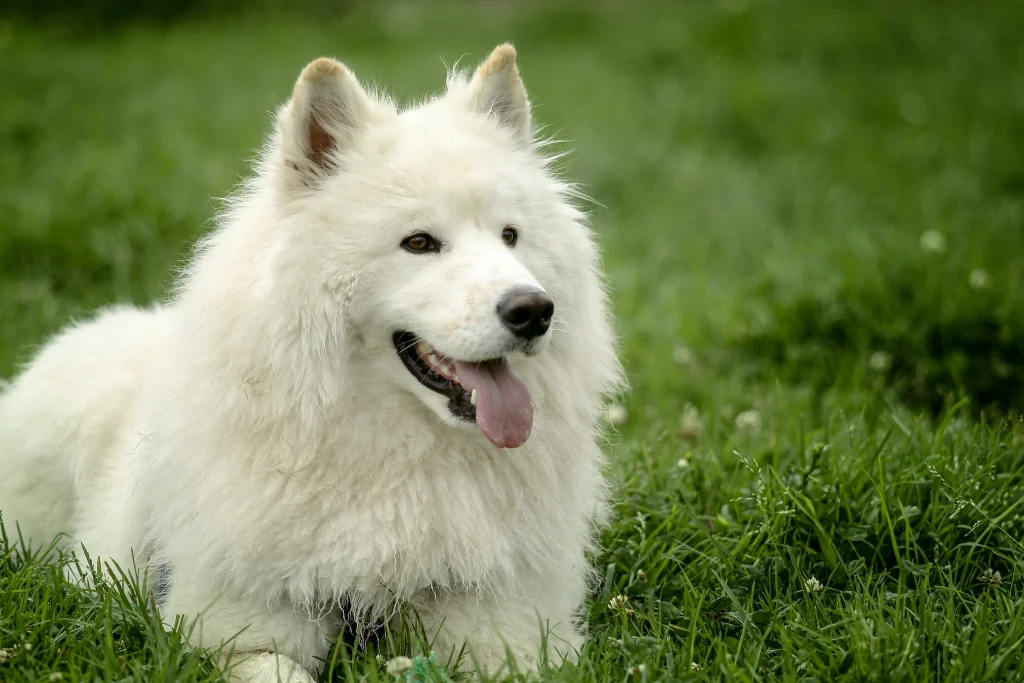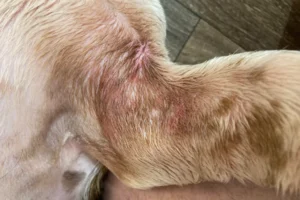Note: We may earn a commission from helpful, relevant links in our content. No cost to you. See our privacy policy.
Every pet parent wants to keep their canine friend healthy, but if you’ve got a white-coated pooch, you might have heard rumors about them being more prone to health problems. Is this true?
Having a white dog doesn’t mean your buddy is destined for poor health. However, being aware of the potential health risks can equip you to take better care of your beloved pet. So let’s dive into what you need to know.

Health Issues Linked to Coat Color
When we talk about health issues linked to a dog’s coat color, we’re mainly focusing on issues tied to pigmentation.
Just like fair-skinned humans, dogs with lighter skin and coat color can be more sensitive to the sun, which may lead to skin problems. Additionally, certain breeds that carry the genes for white coats can also carry genes for health conditions like deafness.
However, it’s crucial to understand that these issues are not inherently caused by a dog’s white coat, but rather by genetic factors that can come along with it.
Any Common Health Problems in White Dogs?
While white dogs are as robust and as resilient as their more colorful counterparts, they may be prone to certain conditions.
One of the most common is skin sensitivity, particularly to sunlight, which can cause sunburns and over time, may lead to skin cancer.
Deafness is also more common in white dogs, especially breeds like Dalmatians and white Boxers.
They might also be more susceptible to eye disorders. However, this predisposition is often breed-specific rather than purely linked to their white coats.
Remember, these health issues are not a guarantee, but having this knowledge enables you to proactively manage your dog’s health and wellbeing.
How to Keep Your White Dog Healthy
Raising a healthy white dog involves a mix of regular vet check-ups, a balanced diet, ample exercise, and a little bit of sun-safety.
Regular grooming is crucial to keep their white coat clean and free from skin irritations.
After grooming, a leave-in conditioner, such as Earthbath Totally Natural Pet Care, can help soothe your white dog’s skin and maintain the shine of their coat. This is an excellent dog shampoo making their coats soft, shiny, and bright.
For sun safety, consider dog-friendly sunscreens or sun-protective clothing, especially during peak sun hours. The Epi-Pet Sun Protector Spray for Pets is a great dog-friendly sunscreen option. It smells great, works great, and is very easy to apply.
This one you probably already know: Include foods rich in Omega-3 fatty acids in their diet for a healthy coat, and always ensure they have fresh water available.
Exercise is as vital for your white-coated friend as any other dog, but for those prone to hearing issues, consider keeping them leashed to avoid any potential accidents. Our guide on Choosing the Right Dog Leash provides comprehensive insights to make this task easier
Regular health screenings can also help catch any potential problems early, while they’re still manageable.

How to Recognize Health Issues in Your White Dog?
Knowing your white dog’s normal behavior is your first line of defense in spotting health issues. Pay attention to any changes in behavior, eating habits, or activity levels.
With skin conditions, you might notice excessive scratching, redness, sores, or changes in coat quality. For more insights, follow our guide on dog skin issues.
For hearing problems, your dog might not respond to commands as they used to, or they might be easily startled. Your dog might also seem disoriented or confused, particularly in new environments or situations. Changes in their sleep pattern or excessive barking can also be a signal.
Eye disorders might present as redness, excessive tearing, or your dog bumping into furniture. Your white dog may also squint or blink excessively, or show signs of discomfort, like rubbing their face on the floor or furniture.
Should you notice any of these signs, it’s essential to seek veterinary advice immediately. Remember, early detection is key to managing and treating any health issues. Your furry friend relies on you to keep them healthy and safe!
Special Considerations for White Puppies
While all puppies require similar basic care, white puppies might benefit from a few additional considerations.
Early introduction to grooming routines, such as brushing and bathing with dog shampoos for sensitive skin, can help manage their skin health and keep their coats pristine.
Training them to wear protective clothing or sunscreen could be beneficial for their future sun safety. For white puppies of breeds prone to deafness, incorporating visual cues into their training from a young age can prepare them for potential hearing loss.
As always, regular veterinary check-ups are essential to monitor their overall health and to timely catch any potential problems.
Related: How to Choose the Right Dog Shampoo
FAQs
How do I protect my white dog’s skin in winter?
During winter, protect your white dog’s skin by reducing bath frequency to prevent skin dryness, and use a moisturizing dog shampoo. Additionally, consider using dog-friendly skin balms and protect their paws with boots during snowy conditions.
What types of dog food are best for white dogs?
For white dogs, consider a diet rich in Omega-3 fatty acids (fish oil) to support their skin and coat health. Always choose high-quality dog food appropriate for your pet’s age, size, and specific health needs.
How often should I groom my white dog?
The frequency of grooming depends on your white dog’s breed and coat type. Generally, brushing should be done a few times a week, and bathing every four to six weeks. However, dogs with longer or thicker coats may require more frequent grooming.
What are some good activities for white dogs with hearing issues?
White dogs with hearing issues can enjoy many activities. Scent games, obstacle courses, and fetch with a scented ball are great options. Always ensure the environment is safe and your dog is closely supervised during these activities to prevent any mishaps.
Alex, a passionate animal lover, has experience in training and understanding animal behavior. As a proud pet parent to two dogs and three cats, he founded AnimalReport.net to share insights from animal experts and expand his knowledge of the animal kingdom.









